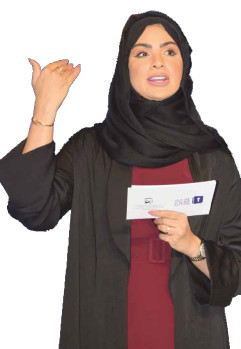Muna Al Kindi: Arab Reading Challenge Supports Sustainable Knowledge
The intention of the Arab Reading Challenge is to encourage students to read through an integrated system that follows them up throughout the year, the Secretary-General of the Arab Reading Challenge Muna Al Kindi told participants at the 2019 Knowledge Summit.
Al Kindi was speaking during a session titled “Arab Reading Challenge: Towards Sustainable Knowledge Development” at the 6th edition of Knowledge Summit. Organized by the Mohammed bin Rashid Al Maktoum Knowledge Foundation (MBRF), the summit ran under the theme “Knowledge: The Path to Sustainable Development”. It was held on November 19-20, 2019 at the Dubai World Trade Center. Al Kindi kicked off the session by giving an overview of the Arab Reading Challenge initiative which was launched four years ago.
“The average level of reading for young children was not more than six minutes. However, we did not waste time by focusing on the negative side as we believe that there is light and hope in every crisis. We have hope that these challenges will be solved, regardless of their severity, with more culture and knowledge, which help us also to find many political, social and economic solutions. The most important question at this stage was why our children do not read.”
She continued: “The starting point was in 2015 when His Highness Sheikh Mohammed bin Rashid Al Maktoum, Vice President and Prime Minister of the UAE and Ruler of Dubai, launched the first knowledge and cultural initiative, which was the first of its kind in the Arab world. One of the most important drivers that contributed to starting the “Arab Reading Challenge” was the belief in the existence of energies and abilities among our children and youth in the Arab world. This Challenge contributes to building the human being and also to spread awareness and culture among this generation, to establish and strengthen the link between them and the books, and renew their relationship with non-school books.” Al Kindi explained that the Arab Reading Challenge makes the participating student read 50 books during the year, and then summarizes them in five “passports” with a value of 10 books for each “passport.” The bottom line is to have the reader to treasure the knowledge acquired from the books during the course of reading, and becomes an ambassador of the reading challenge.
The first edition of the Challenge in 2016 attracted an overwhelming 3.5 million students from 298,000 schools spread in 19 Arab countries and the diaspora.
“The selection of the champions of the challenge was not limited to the Arab world. But there was a special category for the children of Arab communities living in western countries. In addition to categories of Arab students, there was a distinguished school that exerts great effort in raising the level of students participating through motivational programs as well as a distinguished supervisor and the first supporter of the reader at the school. In 2019, we felt more proud of our children as more than 13.5 million students, 67,000 schools and 49 countries participated in the Challenge,” she said.
Al-Kindi pointed out that the new knowledge initiative “Reading Nation”, launched by His Highness Sheikh Mohammed bin Rashid Al Maktoum, is to equip more than 3,000 libraries with approximately five million books in Arab countries with an acute lack of books. This will make the books accessible to every reader. In turn, it will promote reading in the Arabic language for current and future generations since reading is the way to acquire sustainable knowledge capabilities necessary to interact with the era of knowledge and the information revolution. This initiative was organized in coordination with the Ministries of Education of the participating countries and publishing houses.
Al-Kindi said, “The Arab Reading Challenge aims to encourage students to read through an integrated system that follows them up throughout the year, and to discover the inherent talents within them. The knowledge leaves an effective impact in their relationship with their peers and their family and they become positive role models to be followed. The knowledge also improves their personalities and makes them develop ideas about the future. In each new edition, there is always a new addition and surprises to develop the culture and knowledge that the Arab student seeks.”
“In 2019, we were keen to honor the champions of the Challenge through an educational, entertaining and cultural TV program which hosted these participants and highlighted their perseverance, which is the first nucleus of building the human and society. In fact, they are future ambassadors who will maintain the identity of the Arabic language and its position in the world,” she added. Al-Kindi expressed gratitude at the success of the Arab Reading Challenge, with the remarkable change in cultural mobility and cognitive sustainability. She encouraged students to go through experience and keep their perseverance to obtain the title of the challenge champion, especially with the attention of the Ministries of Education from all participating countries.
“We all work as a team, and therefore the Reading Challenge has become a nation project, not a one-state initiative, and our most important goal is to enhance the book’s role in the lives of our children and make reading a sustainable societal value.”








